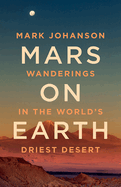
In his captivating travel memoir, Mark Johanson, an American expat living in Chile with his partner, describes being at something of crossroads as the Covid-19 lockdowns were lifting. His journalism career had stalled, and the ongoing political turmoil in Chile caused him to question his decision to settle there. He wanted to know his chosen home better, so he decided to take a solo trip through northern Chile and the Atacama Desert. Johanson explains that the Atacama is home to the world's largest reserve of lithium; it's "in your phones, your laptops, and your cars," but although billions of people rely on the desert's precious resource, very few people actually know much about the region.
Mars on Earth recounts Johanson's exploration. He covers the Atacama's history, including its pre-Colombian populations and their mummies, the conquistadors and their legacies, and the dictatorship of Augusto Pinochet and its failed policies. He delves into natural science, too, analyzing rainfall patterns, extreme elevation, and the clarity of desert night skies. But Mars on Earth is also Johanson's memoir, replete with reflections on being a gay man in the U.S. and Chile, and what it means to choose a new nation as his home.
With Johanson's haunting photographs and intriguing interactions with llama herders, Hindu-inspired hippies, an astrophysicist, and miners, Mars on Earth is fascinating. Johnson notes that deserts are often inhabited by those on the fringes of society. And while few readers may initially agree with his assertion that "deserts are places of utmost appeal," his lyrical descriptions of the Atacama's extreme landscapes might change their minds by the memoir's end. --Jessica Howard, freelance book reviewer

